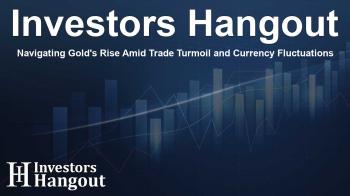Navigating Gold's Rise Amid Trade Turmoil and Currency Fluctuations

Gold Prices Climb in Response to Dollar Weakness
Recently, the price of gold has shown a significant upward trend as investor concerns around trade tensions build up. As markets react to ongoing uncertainties, gold has become an attractive safe-haven asset, leading to increased demand. The gold price rose by approximately 1% recently as the value of the US dollar continued to slide from its recent highs.
Trade conflicts, particularly between the US and China, are at the forefront of investor sentiment. Following implementation of tariffs by the US government, China has retaliated with its own tariffs, leading to a sell-off of the US dollar and an influx of investments into gold and silver.
“The news surrounding tariffs has undeniably influenced market dynamics. The strong dollar we saw earlier in the week is now fading, which typically signals a bullish outlook for gold prices,” said a senior market strategist.
The combination of heightened geopolitical risk and a weakening dollar makes gold more appealing to those holding foreign currencies. Currently, gold has approached notable price levels and is now less than $200 shy of reaching a significant milestone, marking its appeal in the current economic atmosphere filled with uncertainties. Analysts are particularly focused on the implications of ongoing trade negotiations, especially in light of expected macroeconomic reports from the US that could provoke further fluctuations.
Steady Movement in Euro Despite Underlying Concerns
On a different front, the euro has gained ground against the dollar, reflecting a slight recovery amid the turbulence of the trade markets. However, despite a 0.32% increase recently, the euro’s long-term prospects remain tenuous as expectations for the European economy fluctuate, especially with the looming possibility of being affected by US tariffs.
Market participants are keenly watching developments, particularly the ECB's monetary policy, which remains more dovish compared to the Fed's current approach. Traders are anticipating potential interest rate cuts from the ECB, as the economic outlook grows increasingly uncertain.
With key reports on employment and services due for release, the euro's stability will be tested as these will likely influence investor sentiment and market movements.
British Pound Responds to US-China Trade Dynamics
The British pound has reacted to the broader economic conditions, displaying gains against the US dollar. Yet, the ongoing US-China trade war continues to present a bearish backdrop for the pound, which may face inflationary pressures due to tariffs influencing US economic conditions.
“Looking at the ongoing tensions, tariffs are expected to exert upward pressure on inflation, thereby influencing interest rates and the strength of the dollar,” commented an FX trader.
The immediate future for GBP/USD appears quiet, but traders remain alert to any updates regarding potential negotiations that may mitigate these tensions. The upcoming announcement from the Bank of England regarding interest rates will also be a significant focus. Should the BOE signal any economic downgrades alongside dovish remarks, the pound could face headwinds. Conversely, a more optimistic outlook could lend a bullish tone to GBP trades.
Market Sentiment Shapes Investor Strategies
Traders are navigating a landscape marked by uncertainty and potential volatility. The fluctuations in the value of major currencies and commodities underline the need for strategic approaches to investing amidst these market conditions. With constant developments in trade relations and policy directives, staying informed is of utmost importance for effective risk management.
In summary, as we observe gold prices surge in response to currency adjustments and escalating trade tensions, the financial landscape continues to evolve, presenting both challenges and opportunities for investors across various markets.
Frequently Asked Questions
Why are gold prices increasing?
Gold prices are increasing due to weakening dollar value and heightened trade tensions, making gold an attractive safe-haven investment.
What impact do trade tensions have on currencies?
Trade tensions can lead to fluctuations in currency values as investors reassess risks, often resulting in volatility and shifts toward safe-haven assets.
How do tariffs affect the economy?
Tariffs can increase costs for consumers and businesses while potentially leading to inflation, impacting spending and overall economic growth.
What should investors watch for in the coming weeks?
Investors should monitor trade negotiations, central bank announcements, and economic reports that could influence market dynamics and investment strategies.
Can we expect more volatility in the market soon?
Yes, ongoing geopolitical issues and economic indicators may contribute to increased market volatility, influencing investment decisions.
About The Author
Contact Olivia Taylor privately here. Or send an email with ATTN: Olivia Taylor as the subject to contact@investorshangout.com.
About Investors Hangout
Investors Hangout is a leading online stock forum for financial discussion and learning, offering a wide range of free tools and resources. It draws in traders of all levels, who exchange market knowledge, investigate trading tactics, and keep an eye on industry developments in real time. Featuring financial articles, stock message boards, quotes, charts, company profiles, and live news updates. Through cooperative learning and a wealth of informational resources, it helps users from novices creating their first portfolios to experts honing their techniques. Join Investors Hangout today: https://investorshangout.com/
The content of this article is based on factual, publicly available information and does not represent legal, financial, or investment advice. Investors Hangout does not offer financial advice, and the author is not a licensed financial advisor. Consult a qualified advisor before making any financial or investment decisions based on this article. This article should not be considered advice to purchase, sell, or hold any securities or other investments. If any of the material provided here is inaccurate, please contact us for corrections.

